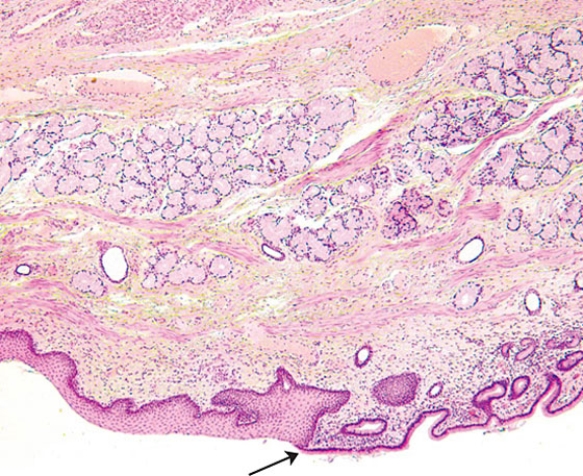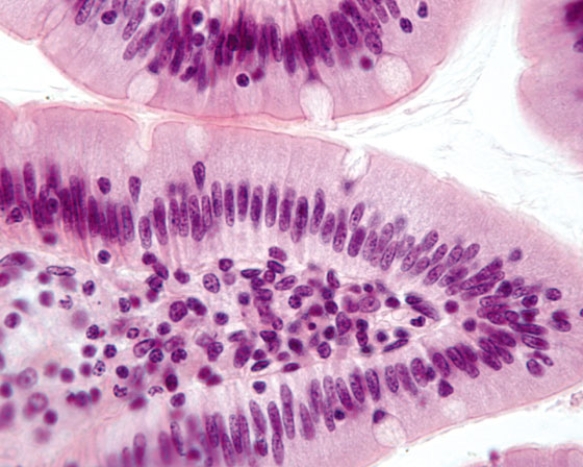Deck 16: Digestive System: Alimentary Canal
Question
Question
Question
Question
Question
Question
Question
Question
Question
Question
Question
Question

Unlock Deck
Sign up to unlock the cards in this deck!
Unlock Deck
Unlock Deck
1/12
Play
Full screen (f)
Deck 16: Digestive System: Alimentary Canal
1
A patient with pernicious anemia has vitamin B12 deficiency. The reason for the deficiency is lack of gastric intrinsic factor (GIF). The cell that secretes GIF is
A) surface lining cell
B) goblet cell
C) chief cell
D) parietal cell
E) mucous neck cell
A) surface lining cell
B) goblet cell
C) chief cell
D) parietal cell
E) mucous neck cell
D
2
Ulcers are caused primarily by bacteria of the genus
A) Helicobacter
B) Streptobacillus
C) Staphylococcus
D) Escherichia
E) Campylobacter
A) Helicobacter
B) Streptobacillus
C) Staphylococcus
D) Escherichia
E) Campylobacter
A
3
Paneth cells
A) are present in the crypts of Lieberkuhn of the colon
B) are antigen-presenting cells
C) manufacture and release chondroitin sulfate
D) are DNES (diffuse neuroendocrine system) cells
E) manufacture and release lysozymes
A) are present in the crypts of Lieberkuhn of the colon
B) are antigen-presenting cells
C) manufacture and release chondroitin sulfate
D) are DNES (diffuse neuroendocrine system) cells
E) manufacture and release lysozymes
E
4
Long-chain fatty acids are
A) reesterified in the cisterna of the rough endoplasmic reticulum (RER)
B) reabsorbed by active transport into the surface absorptive cells
C) transported into the capillaries of the villus
D) emulsified in the lumen of the duodenum by bile
E) normally eliminated as a part of feces
A) reesterified in the cisterna of the rough endoplasmic reticulum (RER)
B) reabsorbed by active transport into the surface absorptive cells
C) transported into the capillaries of the villus
D) emulsified in the lumen of the duodenum by bile
E) normally eliminated as a part of feces

Unlock Deck
Unlock for access to all 12 flashcards in this deck.
Unlock Deck
k this deck
5
The tip of the arrow indicates the junction of the 
A) rectum and the anus
B) rectum and the colon
C) stomach and the duodenum
D) stomach and the esophagus
E) esophagus and the pharynx

A) rectum and the anus
B) rectum and the colon
C) stomach and the duodenum
D) stomach and the esophagus
E) esophagus and the pharynx

Unlock Deck
Unlock for access to all 12 flashcards in this deck.
Unlock Deck
k this deck
6
A patient who has appendicitis does not have which one of the following symptoms?
A) pain in the lower right quadrant of the abdomen
B) nausea
C) vomiting
D) fever
E) lymphocytopenia
A) pain in the lower right quadrant of the abdomen
B) nausea
C) vomiting
D) fever
E) lymphocytopenia

Unlock Deck
Unlock for access to all 12 flashcards in this deck.
Unlock Deck
k this deck
7
The parietal cells of the fundic stomach
A) manufacture visible mucus
B) absorb vitamin B12
C) require cholecystokinin to manufacture HCl
D) require histamine to manufacture HCl
E) require secretin to manufacture HCl
A) manufacture visible mucus
B) absorb vitamin B12
C) require cholecystokinin to manufacture HCl
D) require histamine to manufacture HCl
E) require secretin to manufacture HCl

Unlock Deck
Unlock for access to all 12 flashcards in this deck.
Unlock Deck
k this deck
8
An old patient has a low-grade fever, copious, severe abdominal cramps, and a copious watery diarrhea. The physician believes his condition to be pseudomembranous colitis, an infection caused by bacteria of the genus
A) Clostridium
B) Streptobacillus
C) Staphylococcus
D) Escherichia
E) Campylobacter
A) Clostridium
B) Streptobacillus
C) Staphylococcus
D) Escherichia
E) Campylobacter

Unlock Deck
Unlock for access to all 12 flashcards in this deck.
Unlock Deck
k this deck
9
Which of the following cells is present in the mucosa of the stomach and manufactures visible mucus?
A) surface lining cells
B) mucous neck cells
C) parietal cells (oxyntic cells)
D) M cells
E) chief cells
A) surface lining cells
B) mucous neck cells
C) parietal cells (oxyntic cells)
D) M cells
E) chief cells

Unlock Deck
Unlock for access to all 12 flashcards in this deck.
Unlock Deck
k this deck
10
A patient has Barrett syndrome. The physician should be examining his
A) esophagus
B) stomach
C) small intestine
D) colon
E) rectum
A) esophagus
B) stomach
C) small intestine
D) colon
E) rectum

Unlock Deck
Unlock for access to all 12 flashcards in this deck.
Unlock Deck
k this deck
11
The ileum is easily recognizable because
A) it has glands in the submucosa
B) it has very few goblet cells
C) it has Peyer patches
D) its crypts of Lieberkuhn extend halfway to the muscularis mucosae
E) its crypts of Lieberkuhn extend one third of the way to the muscularis mucosae
A) it has glands in the submucosa
B) it has very few goblet cells
C) it has Peyer patches
D) its crypts of Lieberkuhn extend halfway to the muscularis mucosae
E) its crypts of Lieberkuhn extend one third of the way to the muscularis mucosae

Unlock Deck
Unlock for access to all 12 flashcards in this deck.
Unlock Deck
k this deck
12
In Fig. Img_005a, a patient presents with an ulcer.This photomicrograph shows a healthy area of the ulcerated organ. Where is this patient's ulcer located? 
A) esophagus
B) fundic stomach
C) pyloric stomach
D) duodenum
E) jejunum

A) esophagus
B) fundic stomach
C) pyloric stomach
D) duodenum
E) jejunum

Unlock Deck
Unlock for access to all 12 flashcards in this deck.
Unlock Deck
k this deck


